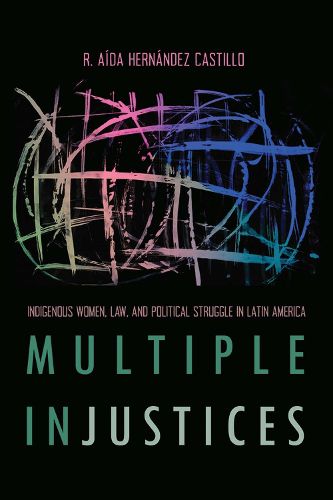Readings Newsletter
Become a Readings Member to make your shopping experience even easier.
Sign in or sign up for free!
You’re not far away from qualifying for FREE standard shipping within Australia
You’ve qualified for FREE standard shipping within Australia
The cart is loading…






The last two decades have witnessed two political transformations that have deeply affected the lives of the indigenous peoples of Latin America. First, a discourse on indigeneity has emerged that links local struggles across the continent with transnational movements whose core issues are racism and political and cultural rights. Second, recent constitutional reforms in several countries recognize the multicultural character of Latin American countries and the legal pluralism that necessarily follows.
Multiple InJustices synthesizes R. Aida Hernandez Castillo’s twenty-four years of activism and research among indigenous women’s organizations in Latin America. As both feminist and critical anthropologist, Hernandez Castillo analyzes the context of legal pluralism wherein the indigenous women of Mexico, Guatemala, and Colombia struggle for justice. Through ethnographical research in community, state, and international justice, she reflects on the possibilities and limitations of customary, national, and international law for indigenous women.
Colonialism, racism, and patriarchal violence have been fundamental elements for the reproduction of capitalism, Hernandez Castillo asserts. Only a social policy that offers economic alternatives based on distribution of wealth and a real recognition of cultural and political rights of indigenous peoples can counter the damage of outside forces such as drug cartels on indigenous lands.
She concludes that the theories of indigenous women on culture, tradition, and gender equity-as expressed in political documents, event reports, public discourse, and their intellectual writings-are key factors in the decolonization of Latin American feminisms and social justice for all.
$9.00 standard shipping within Australia
FREE standard shipping within Australia for orders over $100.00
Express & International shipping calculated at checkout
The last two decades have witnessed two political transformations that have deeply affected the lives of the indigenous peoples of Latin America. First, a discourse on indigeneity has emerged that links local struggles across the continent with transnational movements whose core issues are racism and political and cultural rights. Second, recent constitutional reforms in several countries recognize the multicultural character of Latin American countries and the legal pluralism that necessarily follows.
Multiple InJustices synthesizes R. Aida Hernandez Castillo’s twenty-four years of activism and research among indigenous women’s organizations in Latin America. As both feminist and critical anthropologist, Hernandez Castillo analyzes the context of legal pluralism wherein the indigenous women of Mexico, Guatemala, and Colombia struggle for justice. Through ethnographical research in community, state, and international justice, she reflects on the possibilities and limitations of customary, national, and international law for indigenous women.
Colonialism, racism, and patriarchal violence have been fundamental elements for the reproduction of capitalism, Hernandez Castillo asserts. Only a social policy that offers economic alternatives based on distribution of wealth and a real recognition of cultural and political rights of indigenous peoples can counter the damage of outside forces such as drug cartels on indigenous lands.
She concludes that the theories of indigenous women on culture, tradition, and gender equity-as expressed in political documents, event reports, public discourse, and their intellectual writings-are key factors in the decolonization of Latin American feminisms and social justice for all.